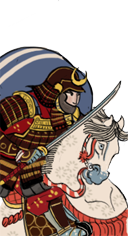
Basic Unit Statistics (can be modified by difficulty level, arts, skills, traits and retainers)
| Recruitment Cost | 300 | |
| Upkeep Cost | 100 | |
| Melee Attack | 14 | 40% |
| Charge Bonus | 15 | 30% |
| Bonus vs Cavalry | 0 | 0% |
| Melee Defence | 6 | 17% |
| Armour | 7 | 46% |
| Morale | 15 | 30% |
Strengths & Weaknesses
- Powerful special abilities.
- General provides big morale bonus to nearby units.
- Vulnerable in melee unless upgraded to focus on that.
Abilities
- Inspire Unit - This unit can choose to inspire a single unit for a short period of time, boosting their morale and greatly improving their marksmanship and melee skills.
- Rally - This unit can rally troops within his area of influence.
- Regroup Position - This general can declare a rally position for withdrawing and routing units to pull back to, and reinforcing units to move towards.
- Stand and Fight - The general dismounts and forms up with his bodyguard around him. All friendly units within a large area have their melee attack, firing rate and morale greatly increased, but the general himself is left immobile and vulnerable until the ability is deactivated.
Description
The duty of this loyal samurai bodyguard is to protect their general from harm, whatever the risk to their own lives.
A general oversees a battle and provides an inspiring example to men whose courage is beginning to falter. His loyal bodyguards consider death in the line of duty to be the greatest thing a warrior can hope to achieve. They are hand-picked samurai of great courage and exceptional skill in combat. This unit can carry out vital manoeuvres such as flanking attacks or chasing routers, but that may leave the general vulnerable, so any aggressive action should be undertaken with great caution. Historically, daimyo surrounded themselves with a large retinue of bodyguards, weapon carriers and various other attendants. The second great unifier of Japan, Toyotomi Hideyoshi (1536-1598) had seven men who acted as bodyguards, named 'yello-horo-shu' after the gold horo they wore, a mark of their great importance. A daimyo may also have had a 'zori tori', who acted as a close personal assistant. Even the task of carrying a warlord's sandals was seen as a great honour, as the attendant was hand-picked by the daimyo himself, proving that he could be trusted and was therefore worthy of respect.